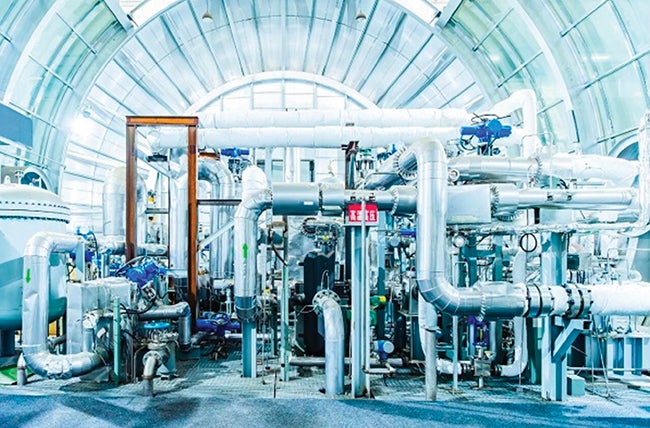A new study from business and environmental researchers at Oxford University disputes the notion that a strategy to transition global power generation toward renewable energy and away from fossil fuels is too expensive to pursue.
The study, released Sept. 13 and published in the journal Joule, reports that decarbonizing the world’s energy systems would save at least $12 trillion by mid-century, compared to continuing to use fossil fuels at the current level. The peer-reviewed study notes that the cost of cleaner energy technology continues to fall. It also concludes that renewable energy has the potential to increase energy output worldwide, and expand access to energy to a larger population.
The study outlines a “Fast Transition” scenario, in which there is a “realistic possible future for a fossil-free energy system by around 2050, providing 55% more energy services globally than today, by ramping up solar, wind, batteries, electric vehicles, and clean fuels such as green hydrogen [made from renewable electricity].”
The Oxford group’s report was released the same day as the U.S. Dept. of Energy’s (DOE’s) report on the possibility of converting closed coal-fired power plants into homes for nuclear power. The DOE said hundreds of coal unit sites across the U.S. could be converted to nuclear power, which “would dramatically increase the supply of firm and dispatchable clean electricity to the grid and deliver huge gains to the nation’s goal of net-zero emissions by 2050.”
The DOE report said a coal-to-nuclear transition “could help increase nuclear capacity in the U.S. to more than 350 GW,” far outpacing the current nuclear power generation capacity of about 95 GW.
Costs of Clean Energy Transition
Dr. Rupert Way, a postdoctoral researcher at the Smith School of Enterprise and the Environment, and lead author of the Oxford study, said, “Past models predicting high costs for transitioning to zero carbon energy have deterred companies from investing, and made governments nervous about setting policies that will accelerate the energy transition and cut reliance on fossil fuels. But clean energy costs have fallen sharply over the last decade, much faster than those models expected.”
Way said, “Our latest research shows scaling-up key green technologies will continue to drive their costs down, and the faster we go, the more we will save. Accelerating the transition to renewable energy is now the best bet, not just for the planet, but for energy costs too.”
The researchers said they analyzed “thousands of transition cost scenarios produced by major energy models,” using data covering 45 years of solar energy costs, 37 years of wind energy costs, and 25 years for battery storage. The group said they found “the real cost of solar energy dropped twice as fast as the most ambitious projections in these models, revealing that over the last 20 years previous models badly overestimated the future costs of key clean energy technologies versus reality.”
Overcoming Misconceptions
Doyne Farmer, a professor who leads the team that conducted the study at the Institute for New Economic Thinking at the Oxford Martin School, said, “There is a pervasive misconception that switching to clean, green energy will be painful, costly and mean sacrifices for us all—but that’s just wrong. Renewable costs have been trending down for decades. They are already cheaper than fossil fuels in many situations, and our research shows they will become cheaper than fossil fuels across almost all applications in the years to come. And, if we accelerate the transition, they will become cheaper faster. Completely replacing fossil fuels with clean energy by 2050 will save us trillions.”
The researchers reported that costs for energy storage technologies, such as batteries, and hydrogen electrolysis are also likely to fall dramatically. Though the debate about the importance of nuclear power to combat climate change continues, the study said the cost of nuclear power has “consistently increased over the last five decades, making it highly unlikely to be cost competitive with plunging renewable and storage costs.”
“The world is facing a simultaneous inflation crisis, national security crisis, and climate crisis, all caused by our dependence on high cost, insecure, polluting, fossil fuels with volatile prices,” said Farmer. “This study shows ambitious policies to accelerate dramatically the transition to a clean energy future, as quickly as possible, are not only urgently needed for climate reasons, but can save the world trillions in future energy costs, giving us a cleaner, cheaper, more energy secure future.”
Rising Costs for Fossil Fuels
The researchers noted that the cost of fossil fuels, including coal and natural gas, have risen sharply since Russia’s invasion of Ukraine, which has led to inflationary pressures worldwide. The Oxford study was conducted prior to that situation, and took into account more than 100 years of fossil fuel price data.
The group notes that the current energy crisis “underscores the study’s findings and demonstrates the risks of continuing to rely on expensive, insecure, fossil fuels. The research confirms that the response to the crisis should include accelerating the transition to low cost, clean energy as soon as possible, as this will bring benefits both for the economy and the planet.”
The report’s research is a collaboration among the Institute for New Economic Thinking at the Oxford Martin School, the Oxford Martin Programme on the Post-Carbon Transition and the Smith School of Enterprise & Environment at the University of Oxford, and SoDa Labs at Monash University.
—Darrell Proctor is a senior associate editor for POWER (@POWERmagazine).



















